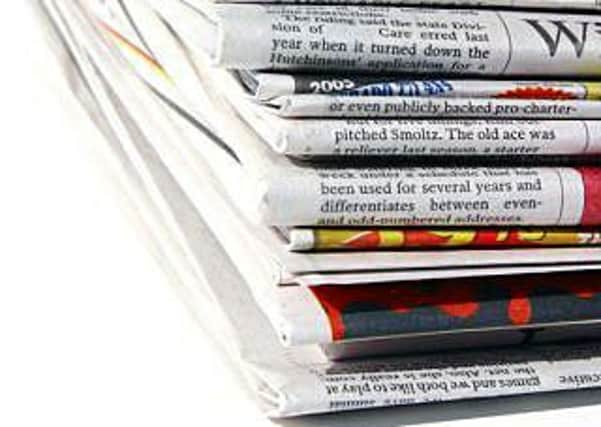Peter Geoghegan: Media-bashing ignores press role


BEING a journalist in Scotland can be a chastening experience. In the past few months, I’ve been labelled a “bigot”, a “unionist stooge” and, my personal favourite, a “nationalist frontman”, which sounds like the centre-forward spot in a far-right fantasy football team.
All this, of course, is fair game. If you want to sound off in public, you should be prepared to cop a few slings and arrows.
Advertisement
Hide AdAdvertisement
Hide AdEven at the best of times, hacks are more tolerated than loved. Now, in the wake of the phone-hacking scandals and the Leveson inquiry, journalists and politicians are duelling it out for the dubious honour of the profession the general public hold in the lowest esteem.
Here in Scotland the already tepid relations between the press and their public have been further chilled not by shocking revelations of journalist malfeasance, but by next year’s referendum.
Many nationalists are of the opinion that Scottish journalism is institutionally biased against their cause. This view was widely in evidence at last month’s SNP conference in Perth.
At a fringe meeting discussion about the challenges facing the Yes campaign in the coming months, a man standing near me shouted: “The media is the problem. They print lies.”
His is hardly a unique viewpoint. When an academic speaker at the same event said, not unreasonably, that the newspaper industry as a whole was in crisis, his comments were met with cheers and clapping.
Given that independence has historically been a minority pursuit, it is probably not surprising many Yes supporters would identify the media as the cause of their travails. That “Scottish journalism”, even if such a monolith existed, would like to see a No vote next year has almost become conventional wisdom. But, as economist JK Galbraith noted when he coined the phrase, conventional wisdom is not necessarily true.
A cursory glance through the comment sections of the Scottish press reveals a broad spectrum of opinion on “the national question”. Nationalists, unlike brethren in Quebec or Catalonia, might not have a newspaper dedicated solely to their cause, but there are plenty of pro-independence voices among our commentariat.
Nationalists are not the only ones crying foul at the media. Last year, Scottish Labour MP Ian Davidson called Newsnight Scotland ‘News-Nat’ throughout an interview on the programme. Extremes on both sides of the independence debate seem to ascribe to a remarkably instrumental view of the media.
Advertisement
Hide AdAdvertisement
Hide Ad“If only the public could hear our message unmediated by those nasty journalists,” the logic runs, “then they would see how right we are.”
Perceptions of media bias in the run-up to next year’s vote are misplaced, says Julian Calvert, lecturer in journalism at Glasgow Caledonian University. “It is a rapidly changing issue. The debates around currency, defence, NATO, have all changed a lot in a short space of time.”
I heard it said by a journalist at a debate about Scottish independence and the media at the Edinburgh festival that his goal was “to create a place where we can have a grown-up and responsible debate about the issues and independence”.
It is an intention that is shared by almost every editor and journalist I have met working in Scotland. Independence is the biggest story in years – it is in the interest of very few in our trade to downplay it.
The position of the Scottish press on nationalism is less negative than its detractors would claim. During the 1980s and early 1990s, the SNP often indirectly benefited from a benign press. This support has been tempered since the emergence of independence as a realistic possibility, but at the last Holyrood election a number of newspapers did back the incumbent nationalist government.
What appetite there is for an avowedly pro-independence media is increasingly being filed online, by dedicated websites. These sites cater for a well-defined target market but inevitably suffer from restricted resources and the obvious limits of a partisan outlook on robust, balanced reporting.
Regardless of the sides they support, newspapers are unlikely to be a deciding factor in the referendum, says Julian Calvert. “I don’t think the press will have a terribly influential role because people know what they are buying and they are re-enforcing their biases.”
Media-bashing might appeal to politicians’ baser instincts – and their electoral base – but it unsettles the middle ground and puts off undecided voters. More importantly, it ignores the biggest problem facing the Scottish press: how to sustain a vibrant, plural media in the 21st century.
Advertisement
Hide AdAdvertisement
Hide AdIndependence might provide a short-term shot in the arm for the Scottish press, but our media faces long-term challenges that need to be addressed. Newspaper sales continue to decline. Budgets are being cut. Media ownership is concentrated into an ever-narrowing number of hands.
Independent journalism at its best holds big business, parliaments and politicians to account. Without aggressive reporters and diligent editors, MPs would continue to claim extravagant expenses, hospitals would continue to fail and schools would close almost unnoticed. But such dogged reporting takes time, expertise and, crucially, money.
As newspapers shrink in size and scope, so does the media’s capacity to act as a democratic watchdog.
If Scotland does become an independent country, it will need an independent media capable of holding the newly-empowered political class to account. But even if it is a No next year, the public will still need an effective, functioning press to guard the guardians. Rather than taking pot shots at the press, politicians and campaigners might be better advised to consider their role in facilitating a media fit for our future, whatever that might be.